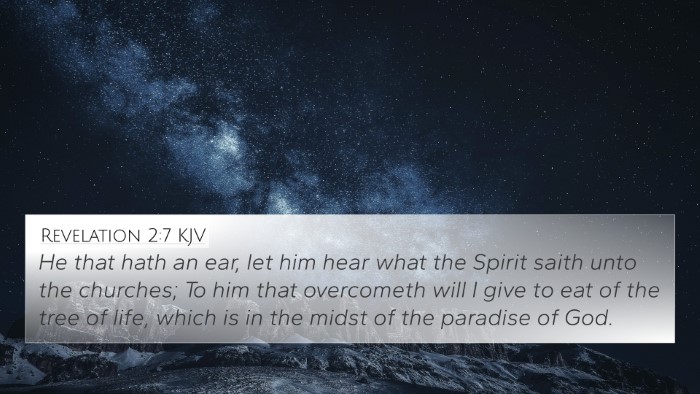Revelation 2:29 serves as a powerful closing remark to the message delivered to the church of Thyatira, emphasizing the importance of listening to the Spirit’s guidance. The call to hear indicates an active engagement with spiritual truth, urging believers to understand and act on the revelations given to the church.
Commentary Insights
-
Matthew Henry:
Matthew Henry explains this verse as an invitation to spiritual attentiveness. He notes that the phrase "He who has an ear" implies that not everyone hears the message, but those who are spiritually tuned should heed the warnings and advice given. The context, a series of warnings and encouragements to the churches, emphasizes the need for vigilance and responsiveness.
-
Adam Clarke:
Adam Clarke highlights that this expression is found throughout the letters to the churches. He believes it is a divine summons for believers to not only listen to the teachings but to internalize them, responding with obedience and faithfulness. Clarke points out that the Spirit speaks universally, making this message relevant for all churches across different ages.
-
Albert Barnes:
Albert Barnes elaborates on the nature of the Spirit's communication through these church letters. He asserts that the Spirit's messages contain both admonition and promise, revealing deeper truths about God's enduring relationship with His followers. By urging listeners to "hear," Barnes emphasizes the transformational power of these insights for the church's spiritual health.
Contextual Analysis
In the book of Revelation, messages are given to various churches, each addressing their specific condition, strengths, and weaknesses. Revelation 2:29 encapsulates the recurring theme of responsiveness to divine counsel.
Key Cross-References
This verse connects to several other scriptures that echo the theme of listening and responding to God’s voice:
- Matthew 11:15 - "He who has ears to hear, let him hear."
- Luke 8:8 - "He who has an ear to hear, let him hear!"
- Revelation 3:6 - "He who has an ear, let him hear what the Spirit says to the churches."
- John 10:27 - "My sheep hear my voice, and I know them, and they follow me."
- Isaiah 55:3 - "Incline your ear, and come to me; hear, that your soul may live."
- Proverbs 8:34 - "Blessed is the man who listens to me, watching daily at my gates, waiting beside my doors."
- James 1:22 - "But be doers of the word, and not hearers only, deceiving yourselves."
Thematic Connections
The message of Revelation 2:29 relates strongly to the broader theme of Bible verse cross-references and the importance of cross-referencing Biblical texts. Throughout Scripture, the call to listen is reinforced in various contexts:
- Listening to God's Voice: From the Old Testament prophets to the New Testament letters, believers are continually reminded to pay attention to God's revelations.
- Obedience to the Word: The connection between hearing and acting is consistently emphasized, making it a central theme in both Testaments.
- The Role of the Holy Spirit: The guidance of the Holy Spirit is crucial in understanding and applying the teachings of Scripture to one’s life.
Cross-Referencing Bible Study Methods
Utilizing tools for Bible cross-referencing can enhance understanding. Resources like a Bible concordance or a cross-reference Bible study guide can assist in identifying connections between verses, promoting a comprehensive study approach.
Conclusion
Revelation 2:29 serves as a reminder of the necessity of spiritual discernment and readiness to embrace God's voice. The insights from public domain commentaries deepen our understanding of this verse's significance within the framework of the entire Scripture. By actively engaging with the Word and utilizing various cross-referencing strategies, believers can enrich their spiritual walk and remain faithful to the teachings of Christ and the guidance of the Holy Spirit.



